新编剑桥商务英语Unit1b
新编商务英语泛读book3unit1B分析解析

Paragraph 7 - 8
What are the two kinds of deceptive pricing? ➢ Misinterpreted credit terms 信用术语的曲解 ➢ Misinterpreted sale prices 销售价格的曲解 What content does the Consumer Credit
to gain certain amount of profit) ➢ To meet competition sacrifice: to dispose of (goods, property,
etc.) regardless of profit
Paragraph 11 - 13
What is “market share”?
Paragraph six
Why do manufacturers give retail prices for their goods? And why was this sort of behavior abolished later?
Resale price maintenance: is the effect of rules imposed by a manufacturer on wholesale or retail resellers of its own products, to prevent them from competing too fiercely on price and thus driving profits down from the reselling activity. The manufacturer may do this because it wishes to keep resellers profitable. Such contract provisions are usually legal under US law but have not always been allowed since they formally restrict free trade.
剑桥商务英语Unit1b
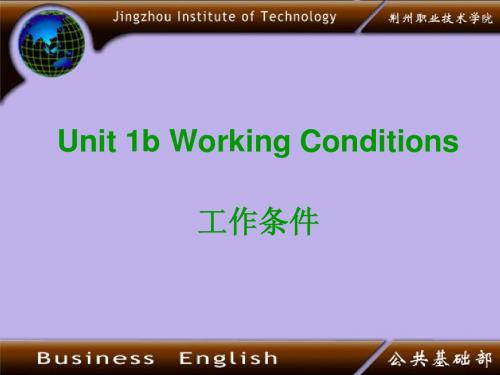
Fibretech’s condition of employment
HOURS 工作时间条款 1. The normal hours of work are eight hours a day, Monday to Friday. A shift system is in operation. The shift are A 06:00 – 14:00 B 14:00 – 22:00 C 22:00 – 6:00 in operation 表示“在实施中”的意思。比如:Nowadays, there are a number of different systems in operation. 当前,实行着好几种不同的制度。 2. Week one: Group one Shift A Group two Shift B Group three Shift C Week two: Group one Shift B Group two Shift C Group three Shift A Week three: Group one Shift C Group two Shift A Group three Shift B
Fibretech’s condition of employment
提示: These terms and conditions should be read before you sign your contract. SALARY 有关工资的条款: Your starting salary is £14,000. This is reviewed annually.
break down 出故障 e.g. The car brorarely occasionally sometimes frequently never 从不 > rarely 很少 > occasionally 偶尔 > sometimes 有时 > frequently/often 经常 > usually 通常 > always 总是 often usually
新剑桥商务英语习题答案
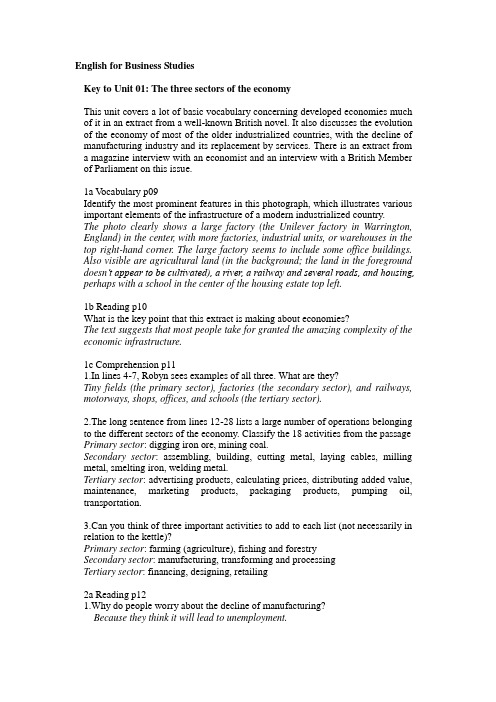
English for Business StudiesKey to Unit 01: The three sectors of the economyThis unit covers a lot of basic vocabulary concerning developed economies much of it in an extract from a well-known British novel. It also discusses the evolution of the economy of most of the older industrialized countries, with the decline of manufacturing industry and its replacement by services. There is an extract from a magazine interview with an economist and an interview with a British Member of Parliament on this issue.1a V ocabulary p09Identify the most prominent features in this photograph, which illustrates various important elements of the infrastructure of a modern industrialized country.The photo clearly shows a large factory (the Unilever factory in Warrington, England) in the center, with more factories, industrial units, or warehouses in the top right-hand corner. The large factory seems to include some office buildings. Also visible are agricultural land (in the background; the land in the foreground doesn’t appear to be cultivated), a river, a railway and several roads, and housing, perhaps with a school in the center of the housing estate top left.1b Reading p10What is the key point that this extract is making about economies?The text suggests that most people take for granted the amazing complexity of the economic infrastructure.1c Comprehension p111.In lines 4-7, Robyn sees examples of all three. What are they?Tiny fields (the primary sector), factories (the secondary sector), and railways, motorways, shops, offices, and schools (the tertiary sector).2.The long sentence from lines 12-28 lists a large number of operations belonging to the different sectors of the economy. Classify the 18 activities from the passage Primary sector: digging iron ore, mining coal.Secondary sector: assembling, building, cutting metal, laying cables, milling metal, smelting iron, welding metal.Tertiary sector: advertising products, calculating prices, distributing added value, maintenance, marketing products, packaging products, pumping oil, transportation.3.Can you think of three important activities to add to each list (not necessarily in relation to the kettle)?Primary sector: farming (agriculture), fishing and forestrySecondary sector: manufacturing, transforming and processingTertiary sector: financing, designing, retailing2a Reading p121.Why do people worry about the decline of manufacturing?Because they think it will lead to unemployment.2.Which activities are as important as the production of goods?Designing goods, persuading people to buy them; arts and entertainment.3.Should people worry about this state of affairs?No, because it is a natural, progressive and inevitable development.2b Listening p13Listen to a short interview with Denis MacShane, a British Member of Parliament for the Labor Party.Does he hold the same view as J. K. Galbraith?Denis MacShane quite clearly disagrees with Galbraith.1.Why does MacShane think that manufacturing has a future?Because there are many new products that have to be invented to serve new needs.2.Why does MacShane think that manufacturing has a future in the advanced countries?Because these countries have production technology that requires very little labor input.3.Why, however, is this manufacturing unlikely to solve the problem of unemployment?Precisely because it requires very little labor input.4.What does MacShane mean by ‗in theory there should be no more manufacturing‘ in Switzerland? (It is this theory that makes many people argue that m anufacturing must move to ‗less-developed‘ countries.)The conventional theory is that the most important cost in manufacturing is labor, and wages and salaries in Switzerland are the highest in the world. (As is the cost of living!)5.Why does he say it is surprising for a British company to be buying Swiss goods?Because the pound sterling has, over the years, lost a great deal of value against foreign currencies, especially the Swiss franc.6.What is the reason he gives for the United States still being the richest nation in the world?It has a successful manufacturing economy, including its computer and car (automobile) industries.7.Match up the following expressions and definitions:1.to convert itself. B/ to change from one thing to another2.to serve needs D/ to satisfy people’s desires or requirementsbor input A/ manual work4.to stumble on E/ to discover something by accident5.to be dubious C/ to be uncertain, disbelieving2c Writing p13Summarize both Gallbraith‘s and MacShane‘s arguments in a short paragraph of fewer then 50 words.A POSSIBLE SUMMARY Galbraith says that manufacturing industry will inevitably decline in the advanced industrial countries, and be replaced by design, advertising, entertainment, and so on. MaShane says that manufacturing will change, and make new products with new technology.New words in this unit 01agriculture, business, company, consumer, economic, economy, employment, goods, industry, infrastructure, labour, manufacturing, primary sector, product, raw materials, secondary sector, tertiary sector, unemploymentUnit 2 ManagementManagement is important. The success or failure of business organizations, government institutions and public sector services, voluntary and non-profit organizations, sports teams, and so on, often depends on the quality of their management. This unit includes a discussion of the qualities required by managers, a definition of management, consideration of the role of the meetings in management, a critical view of the management of one large American multinational company, and an interview with the manager of a British department store, who discusses his job.Before the discussion on the qualities required by managers and the definition of management, maybe we can discuss the cartoo n. What‘s the joke? We can assume that Mr. Farvis runs this company (his name is on the door). What can we say about his managerial skills, or his apparent lack of them?Discuss in pairs for two minutes what exactly managers do, concerning organizing, setting objectives, allocating tasks and resources, communicating, motivating, and so on.1a DiscussionWhat is management? Is it an art or a science? An instinct or a set of skills and techniques that can be taught?Management is a mixture of innate qualities and learnable skills and techniques.What do you think makes a good manager? Which four of the following qualities do you think are the most important?Being decisive: able to make quick decisionsBeing efficient: doing things quickly, not leaving tasks unfinished, having a tidy desk, and so onBeing friendly and sociableBeing able to communicate with people -----Being logical, rational and analyticalBeing able to motivate and inspire and lead people -----Being authoritative: able to give ordersBe ing competent: knowing one’s job perfectly, as well as the work of one’s subordinates -----Being persuasive: able to convince people to do thingsHaving good ideas -----Are there any qualities that you think should be added to this list?Which of these qualities can be acquired? Which must you be born with?There are clearly no definitive answers as to which of these skills can be acquired.1b ReadingPeter Drucker, the (Austrian-born) American management professor and consultant, is the author of many books about business. This text summarizes some of Peter Drucker‘s views on management. It paraphrases the extended definition of management he gives in one of his management textbooks. As you read about his description of the work of a manager, decide whether the five different functions he mentions require the four qualities you selected in your discussion, or others you did not choose.What is management?Drucker’s first point (setting objectives and developing strategies) presumably requires qualities J, H, E and A (not necessarily in that order). The second point (organizing) presumably also requires H, E and J. The third point (motivation and communication) embraces F, D, I and probably C. The fourth point (measuring performance) probably requires H and E. The fifth point (developing people) might require H, F, D and J. But all this is clearly open to discussion.1c V ocabularyComplete the following sentences with these words.Achieved; board of directors; communicate; innovations; manageable; performance; resources; setting; supervise1.managers have to decide how best to allocate the human, physical and capitalresources available to them.2.Managers -- logically – have to make sure that the jobs and tasks given to theirsubordinates are manageable.3.There is no point in setting objectives if you don‘t communicate them to yourstaff.4.Managers have to supervise their subordinates, and to measure, and try toimprove, their performance.5.Managers have to check whether objectives and targets are being achieved.6.A top manager whose performance is unsatisfactory can be dismissed by thecompany‘s board of directors.7.Top managers are responsible for the innovations that will allow a company toadapt to a changing world.1d V ocabularyThe text contains a number of common verb-noun partnerships (e.g. achieve objectives, deal with crises, and so on).Match up these verbs and nouns to make common collocations.Allocate resources (or people)Communicate information (or decisions)Develop strategies (or people or subordinates)Make decisionsMeasure performanceMotivate peoplePerform jobsSet objectivesSupervise subordinates2 Meetings‘One can either work or meet. One cannot do both at the same time.’(Peter Drucker: An Introductory View of Management)What do you think Peter Drucker means by this comment?Drucker obviously believes that work is largely something that is done individually, and that meetings are not ‘work’, but merely preparation for it, or consolidation after it.2a Reading p18Read the computer journalist Robert X. Cringely‘s description of the management style at IBM.Is he positive or negative about IBM‘s working culture?Robert Cringely’s history of the personal computer industry is very informative, in places very critical, and also very funny. In this extract, he is extremely negative about IBM, saying that they put much too much effort into management and worrying about the possibility of making bad decisions, and not enough into producing good, competitively-priced products.2b ComprehensionExplain in your own words exactly what Robert Cringely means in the following sentences.1.Every IBM employee‘s ambition is apparently to become a manager.It seems as if the people who work for IBM are more interested in being regarded as a manager than as a computer designer or technician2.IBM makes management the company‘s single biggest business.IBM’s corporate culture seems to place more emphasis on management than on developing and selling the company’s products.3.IBM executives manage the design and writing of software.IBM’s managers don’t actually do the work of designing and writing software themselves, but organize and supervise the people who do it.4.IBM products aren‘t often very competitive.IBM products are rarely as good or as dheap as similar products made by their competitors5.The safety net at IBM is so big it is hard to make a bad decision.There is an extensive hierarchy and a system of checks and controls whichensures that bad decisions are generally avoided (but good decisions also take a very long time to make).6.This will be the source of the company‘s ultimate downfall.The slowness of IBM’s decision-making process (and the consequent lack of competitiveness of their products) will eventually destroy the company.2c V ocabulary p18Find word in the text that mean the same as the words or expressions below.1.seemingly apparentlyputer programs software3.work, time and energy effortputers (and other machines) hardware5.young workers still learning their jobs trainees6.knowledge and skill expertise7.levels or strata layers8.to make certain that something is true verify9.corrected or slightly changed amended10.collapse or failure downfall3 The retail sectorYou will hear part of an interview with Steve Moody, the manager of the Marks & Spencer store in Cambridge, England.What do you know about Marks & Spencer?M&S, as many people call them in Britain sell clothes, household goods and food. They have branches all over Britain, and are expanding into continental Europe. 3a Listeninglisten to part One, in which Steve Moody describes the role and responsibilities of a store manager.Tapesript Part OneSTEVE MOODY so, as the store manager in Cambridge, which is probably the fortieth largest of the 280 stores we have got, I am responsible for the day-to-day running of the store. All the product is delivered to me in predescribed quantities, and obviously I’m responsible for displaying that merchandise to its best advantage, obviously I’m responsible for employing the staff to actually sel l that merchandise, and organizing the day-to-day logistics of the operation. Much more running stores is about the day-to-day operation. And ensuring that that’s safe, and obviously because of the two hundred people that we would normally have working her e it’s ensuring that they are well trained, that they are well motivated, and that the environment they work in is a pleasant one, that they are treated with respect, and that they are committed to the company’s principles. Which of the following tasks is he responsible for?1.designing the store and its layout2.displaying the merchandise3.employing the sales staff4.ensuring the safety of staff and customers5.establishing the company‘s principles6.getting commitment from the staff7.increasing profits8.maintaining a pleasant working environment9.motivating staffanizing the day-to-day logistics11.pricing the merchandise12.running 40 out of 280 stores13.selecting the merchandise14.supervising the day-to-day running of the store15.training staff3b ListeningListen to Part Two, and answer these questions.Tapescript Part TwoINTERVIEWER How much freedom do those people have within their jobs to make decisions themselves? How much delegation is there of responsibility down the chain?STEVE MOODY We would , as a business, like to encourage as much accountability and delegation as possible. Of course that does depend on the abilities of the individuals, the environment in which you’re working, and the time of year. With 282 stores we have a corporate appearance in the United Ki ngdom’s high streets. It is quite important that when customers come into Marks & Spencer’s Cambridge they get the same appearance and type of looking store and the same level of service that they would expect if they went into Marks & Spencer’s Edinburgh in Scotland, for example, and it’s very important that we have a corporate statement that customers understand. So, there are obviously parameters and disciplines that, you know, not only the staff but supervision and management would follow. Within that, in terms of development and training, training is obviously an investment for all staff. If staff are trained to do their job well and they understand it, they will feel confident in what they’re doing, that in turn will give a better service to the customers, obviously from Marks & Spencer’s point of view it could well lead to increased sales.1.Why are Marks & Spencer‘s store managers limited in giving accountability totheir staff and delegating responsibilities?Although marks & Spencer ‘would like to en courage as much accountability and delegation as possible’, they have a corporate appearance for all their stores, in all of which customers should get the same level of service. This limits the freedom of individual mangers to change the stores: there are ‘parameters and disciplines that not only the staff but supervision and management would follow’.2.What do they concentrate on instead?Instead, they concentrate on staff development and training.3c listeninglisten to Part Three, and answer the following questions.Tapescript Part ThreeINTERVIEWER Do you have meetings for members of staff where they can express views about what’s going on in the store?STEVE MOODY We have a series of meetings, management and supervisoryevery week we have something whi ch Marks & Spencer’s call a focus group, which is members of staff who get together regularly from all areas of the store, so from the food section and perhaps the menswear section, from the office who do the stock and accounting, and indeed the warehouse where people receive goods. They have meetings, they discuss issues, they discuss problems that they feel are going on in the store. They also discuss suggestions of how they can improve that we run the store, and they discuss that amongst themselves first. They will then have a meeting with members of management and obviously myself, and we will discuss those issues and work together to try and provide solutions. However, Marks & Spencer’s philosophy, I suppose, is that meetings should not be substitute for day-to-day communication and therefore if problems do arise in terms of the operation, or an individual has got a problem in their working environment, or indde their immediate line manager, or indeed if they have a problem outside, which might be domestic, or with their family, we would like to discuss that as it arises and would like to encourage a policy that they will come and talk to their supervisor or their manager, to see what we can do to solve the problem.Steve Moody mentions two kinds of regular meetings. The first is weekly meetings for management and supervisory staff.1.What is the second kind of meeting called?A focus group.2.Who attends them?Members of staff from all areas of the store (e.g. the food section, the menswear section, the stock and accounting office, the warehouse, and so).3.What are they designed to achieve?Staff can discuss problems in the store, and make suggestions for improvements. After this, they will meet with members of management to discuss those issues and try to provide solutions.4.What kind of problems cannot be dealt with by meetings?Individuals’ problems with their work or their line manager, or even family problems5.How are such problems dealt with?Individuals are encouraged to discuss such problems with their supervisor or manager.3d DiscussionAfter reading and hearing about management, do you think you have the right skills to be a manager? Would you be able, for example, to set objectives, motivate and coordinate the staff, and manage a department store, or a computer manufacturer?Some learners may decide that they have the necessary abilities to become a manager or even a top manager; others may envisage more specialized careers in a particular function such as marketing, finance, computing, accounting, and so on, which will not involve managing and coordinating a large number of people and operations.New words in this unit 02Allocate, banker, board of directors, chairman, competitive, customer, director, distributor, function, hardware, innovation, investor, logistics, manageable, management, manager, measure, meeting, merchandise, motivate, objective, organization, pay, performance, promotion, resources, software, staff, strategy, subordinate, supervise, supplier, tactics, team, top manager, trainee.Unit 3 Company structureOne of the most important tasks for the management of any organization employing more than a few people is to determine its organizational structure, and to change this when and where necessary. This unit contains a text which outlines the most common organizational systems and exercise which focuses on the potential conflicts among the different departments of a manufacturing organization, an example of an organization chart, and a critical look at the flexible organizational structure of an American computer company.1a DiscussionThis discussion activity follows on naturally from activity 3d in the previous unit, about managing companies or having more limited responsibilities in a particular department.1b V ocabulary1. Autonomous: C independent, able to take decisions without consulting a higher authority2. Decentralization: E dividing an organization into decision-making units that are not centrally controlled.3. Function: B a specific activity in a company, e.g. production, marketing, finance4. Hierarchy: A system of authority with different levels, one above the other.5. Line authority: F the power to give instructions to people at the level below in the chain of command6. Report to: G to be responsible to someone and to take instructions from him or her7. Subordinates: D people working under someone else in a hierarchy1c ReadingThe text summarizes the most common ways in which companies and other organizations are structured, and mentions the people usually credited with inventing functional organization and decentralization. It mentions the more recent development of matrix management, and a well-known objection to it. How arte most organizations structured?Most companies are too large to be organized as a single hierarchy. The hierarchy is usually divided up. In what way?What are the obvious disadvantages of functional structure?(Discuss briefly in pairs) give some examples of standard conflicts in companies between departments with different objectivesAre there any other ways of organizing companies that might solve theseproblems?A.Functional structureB.Matrix structureC.Line structureD.Staff structureBritish: personnel department = American: staff department or human resources department1d ComprehensionThe only adequate summary is the second. The first stresses the disadvantages of hierarchies much more strongly than the text, and disregards the criticisms of matrix management and decentralization. The third is simply misleading: matrix management and teams are designed to facilitate communication among functional departments rather than among autonomous divisions.Second summaryMost business organizations have a hierarchy consisting of several levels and a clear line of command. There may also be staff positions that are not integrated into the hierarchy. The organization might also be divided into functional departments, such as production, finance, marketing, sales and personnel. Larger organizations are often further divided into autonomous divisions, each with its own functional sections. More recent organizational systems include matrix management and teams, both of which combine people from different functions and keep decision-making at lower levels.1e discussionThe text mentions the often incompatible goals of the finance, marketing and production (or operations) department. Classify the following strategies according to which departments would probably favor them.Production managers: 1.a factory working at full capacity 4.a standard product without optional features 11.machines that give the possibility of making various different products. (1, 4 and 11 would logically satisfy production managers, although 11 should also satisfy other departments.)Marketing managers: 2.a large advertising budget 3.a large sales force earning high commission 6.a strong market share for new products 7.generous credit facilities for customers rge inventories to make sure that products are available (2, 3, 6, 7, 9, would logically be the demands of marketing managers) Finance managers: 5.a strong cash balance 8.high profit margins 10.low research and development spending 12.self-financing (using retained earnings rather than borrowing) (5, 8, 10, and 12 would logically keep finance managers happy.)1f Describing company structureNow write a description of either the organization chart above, or a company you know, in about 100-150 words.Here is a short description of the organization chart illustrated.The Chief Executive Officer reports to the President and the Board of Directors. The company is divided into five majordepartments: Production, Marketing, Finance, Research & Development, and Personnel. The Marketing Department is subdivided into Market Research, Sales, and Advertising & Promotions. The Finance Department contains both Financial Management and Accounting. Sales consists of two sections, the Northern and Southern Regions, whose heads report to the Sales Manager, who is accountable to the Marketing Manager.2a V ocabularyMatch up the words on the left with the definitions on the right.1.industrial belt: C an area with lots of industrial companies, around the edge of acity2.wealth: F the products of economic activity3.productivity: E the amount of output produced (in a certain period, using acertain number of inputs)4.corporate ethos: A a company‘s ways of working and thinking5.collaboration: G working together and sharing ideas6.insulated or isolated: B alone, placed in a position away from others7.fragmentation: D breaking something up into pieces2b ListeningListen to Jared Diamond, and then answer question 1. Listen a second time to check your answers, and then do question 2.1 Which of these do the part-sentences 1-8 refer to?A Route 128 (the industrial belt around Boston, Massachusetts)B Silicon Valley (the high-tech companies in the area between San Francisco and San Jose, California)C IBMD Microsoft1 has lots of companies that are secretive, and don‘t communicate or collaborate with each other. (A)2 has lots of companies that compete with each other but communicate ideas and information. (B)3 has always had lots of semi-independent units competing within the same company, while communicating with each other. (D)4 is organized in an unusual but very effective way (D)5 is currently the center of innovation (B)6 used to have insulated groups that did not communicate with each other (C)7 used to lead the industrial world in scientific creativity and imagination (A)8 was very successful, then less successful and is now innovative again because it changed the way it was organized (C)2 Working in pairs, rearrange the following part-sentences to make up a short paragraph summarizing Diamond‘s ideas about the best form of business organization.A and regularly engage staff who have worked for your competitors.B are at a disadvantage,C because most groups of people getD but also communicate with each other quite freely.E creativity, innovation, and wealth,F into a number of groups which competeG Isolated companies or groupsH most of their ideas and innovations from the outside.I So order to maximize productivity,J You should also exchange ideas and information with other companies,K you should break up your businessIsolated companies or groups are at a disadvantage, because most groups of people get most of their ideas and innovations from the outside. So order to maximize productivity, creativity, innovation, and wealth, you should break up your business into a number of groups which compete but also communicate with each other quite freely. You should also exchange ideas and information with other companies, and regularly engage staff who have worked for your competitors.3a DiscussionRead the following statements, and decide whether they are about the advantages of working in a big or small company.Advantages of working in a small company: 2, 3, 4, 7, 9, 11, 13.Advantages of working in a big company: 1, 5, 6, 7, 8, 10, 12, 14.Some of these answers are open to discussion. For example, number 8: some people might argue that you have a better possibility of realizing your potential in a small company in which you are required to take on a number of different tasks. New words in this unit 03Autonomous, boss, chain of command, Chief Executive Officer (CEO), collaboration, competitor, corporate ethos, decentralization, department, division, downsizing, downturn, finance, fragmentation, functional organization, hierarchy, input, insulated, isolated, level, line authority, Managing Director, marketing, output, personnel, position, President, production, productivity, reorganization, report to, responsibility, salary, sales, subsidiary, wealth.Unit 04 Work and motivationAs well as setting and communicating objectives, developing strategies, and。
2023年新编剑桥商务英语BEC第三版中级Module1

Module 1 第一单元1.1 Business Topic Ways of working 商务话题篇工作方式1) Vocabulary: different ways of working (15 mins)regular hours 正常工作时间flexible (working) hours/flex(i)time 弹性工作时间freelance n. 自由职业teleworking n. 电子办公;在家中上班job-share v. / n. 分担工作;工作分担制job-sharing n. 分担工作job-sharer n. 与人分担工作的人shift work 轮班工作,倒班制temping n 当临时工,任临时雇员consultancy n. 征询公司specialist advice 专业征询hotdesking (hot-desking) n. 办公桌轮用(指将职工提成不同的班次,以便他们能共用一间办公室,一张办公桌和一台电脑)office gossip 办公室小道消息,办公室飞短流长office news 办公室新闻credit n. 赞扬,功劳managing director 总裁,总经理(美英chief executive/president)brainpower n. 智能worst-case adj. 做最坏打算的,为最坏情况的,为最不利条件的scenario n. 事态,局面full-time adj. 全日制的delegate v. 授权,分派工作availability n. 运用(或获得的)也许性,可以运用的人(物),人员、物资保证parental leave 育儿假,照顾新生儿女假distractions n. 让人注意力分散的事物contact n. 人脉,有影响力的熟人,有用的社会关系case-load n. 工作量daily log 日记voice mail 语音信箱,语音邮件self-organization n. 自我组织能力disruptive a. 导致混乱的1. How do you work most effectively? By working…regular hours/flexible hours? in a team/on your own?from home/ in an office? for a boss/as your own boss?参考词语和表达:routine type of person 按部就班的人have flexible management of time and work 灵活安排自己的时间和工作get support from each other 互相支持co-operate with each other 互相合作share ideas 交流想法learn from other people’s strong points 学别人所长working in a team needs to have good interpersonal skills and is not necessarily efficiently.在团队工作需要有很好的人际交往技能,不一定效率就高can be more concentrated and thus more efficient in an office在办公室更容易集中精力因此也更有效率have more flexibility 享有更多的灵活度feel more relaxed 感觉更轻松a dependent type of person and never make decisions myself性格依赖,不喜欢自己拿主意an independent type of person and would like to make decisions myself性格独立,喜欢自己做决定don’t want to work under someone 不想在别人手下工作5. Reading: How to job-shareGet organized Set your limits Put pen to paper Two become one安排有序规定限度签订协议合二为一Open your mind Plan for disaster Find the perfect partner Don’t feel guilty敞开心胸/开拓视野有备无患抱负搭档勿感内疚1. share credit and blame 分担成绩与过失,意译“功过与共”2. Flexecutive 经营内容蕴含其中的公司名flexible与executive两词复合而成“弹性经营管理”。
剑桥商务英语初级完整
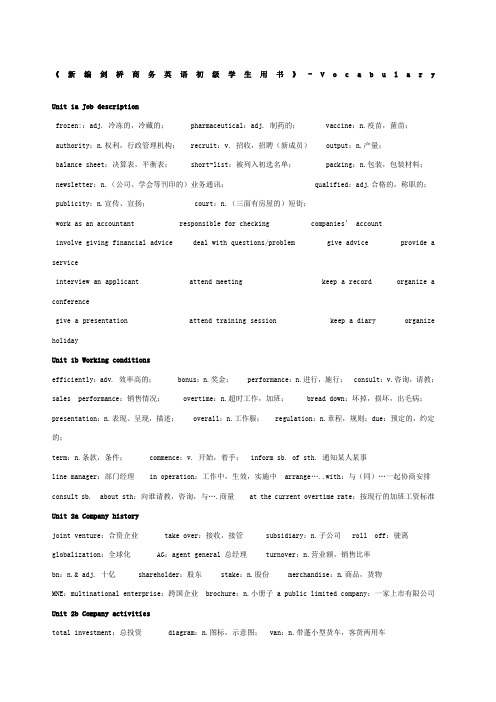
《新编剑桥商务英语初级学生用书》-V o c a b u l a r yUnit 1a Job descriptionfrozen::adj. 冷冻的,冷藏的; pharmaceutical:adj. 制药的; vaccine:n.疫苗,菌苗;authority:n.权利,行政管理机构; recruit:v. 招收,招聘(新成员) output:n.产量;balance sheet:决算表,平衡表; short-list:被列入初选名单; packing:n.包装,包装材料;newsletter:n.(公司、学会等刊印的)业务通讯; qualified:adj.合格的,称职的;publicity:n.宣传、宣扬; court:n.(三面有房屋的)短街;work as an accountant responsible for checking companies’ accountinvolve giving financial advice deal with questions/problem give advice provide a serviceinterview an applicant attend meeting keep a record organize a conferencegive a presentation attend training session keep a diary organize holidayUnit 1b Working conditionsefficiently:adv. 效率高的; bonus:n.奖金; performance:n.进行,施行; consult:v.咨询,请教;sales performance:销售情况; overtime:n.超时工作,加班; bread down:坏掉,损坏,出毛病;presentation:n.表现、呈现,描述; overall:n.工作服; regulation:n.章程,规则;due:预定的,约定的;term:n.条款,条件; commence:v. 开始,着手; inform sb. of sth. 通知某人某事line manager:部门经理 in operation:工作中,生效,实施中 arrange…..with:与(同)…一起协商安排consult sb. about sth:向谁请教,咨询,与….商量 at the current overtime rate:按现行的加班工资标准Unit 2a Company historyjoint venture:合资企业 take over:接收,接管 subsidiary:n.子公司 roll off:驶离globalization:全球化 AG:agent general 总经理 turnover:n.营业额,销售比率bn:n.& adj. 十亿 shareholder:股东 stake:n.股份 merchandise:n.商品,货物MNE:multinational enterprise:跨国企业 brochure:n.小册子 a public limited company:一家上市有限公司Unit 2b Company activitiestotal investment:总投资 diagram:n.图标,示意图; van:n.带蓬小型货车,客货两用车assembly plant:装配厂 extract:n.摘录,选段 grant:n。
新编剑桥商务英语中级学生用书
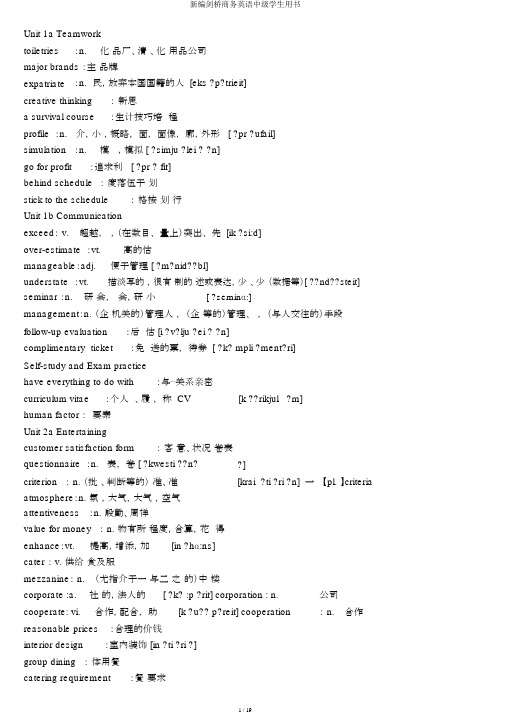
Unit 1a Teamworktoiletries:n.化品厂、清、化用品公司major brands :主品牌expatriate:n. 民,放弃本国国籍的人 [eks ?p?trieit]creative thinking:新思a survival course:生计技巧培程profile :n. 介,小,概略,面,面像,廓,外形 [ ?pr ?ufail]simulation:n.模,模拟 [ ?simju ?lei ? ?n]go for profit:追求利 [ ?pr ? fit]behind schedule:度落伍于划stick to the schedule:格按划行Unit 1b Communicationexceed: v.超越,,(在数目、量上)突出、先 [ik ?si:d]over-estimate :vt.高的估manageable:adj.便于管理 [ ?m?nid??bl]understate:vt.描淡写的,很有制的述或表达,少、少(数据等)[ ??nd??steit] seminar :n.研会,会,研小[ ?seminɑ:]management:n. (企机关的)管理人,(企等的)管理、,(与人交往的)手段follow-up evaluation:后估 [i ?v?lju ?ei ? ?n]complimentary ticket:免送的票,待券 [ ?k? mpli ?ment?ri]Self-study and Exam practicehave everything to do with:与⋯关系亲密curriculum vitae:个人、履,称 CV[k ??rikjul ?m]human factor :要素Unit 2a Entertainingcustomer satisfaction form:客意、状况卷表questionnaire :n. 表,卷 [ ?kwesti ??n??]criterion : n. (批、判断等的)准、准[krai ?ti ?ri ?n] →【pl. 】criteria atmosphere:n. 氛,大气,大气,空气attentiveness :n. 殷勤、周祥value for money:n.物有所程度,合算,花得enhance:vt.提高,增添,加[in ?hɑ:ns]cater : v. 供给食及服mezzanine: n.(尤指介于一与二之的)中楼corporate :a.社的,法人的[ ?k? :p ?rit] corporation : n. cooperate: vi.合作,配合,助[k ?u?? p?reit] cooperation reasonable prices:合理的价钱interior design:室内装饰[in ?ti ?ri ?]公司: n.合作group dining:体用餐catering requirement:餐要求tour groups:旅行corporate events:公司交际活wine tastings:品酒会steak :n. 牛排 [steik]company presentations :公司告会 [ ?prez ?n?tei ? ?n]business trip :公旅行vegetarian :n. 素食者 a. 素食者的,只有蔬菜的 [ ?ved?i ?t ? ?ri ?n]evolve : v. 逐展或达成,演,演化[i ?v? lv]evolution: n.演,化,展 [?i:v ??lu: ? ?n]pride ourselves on/upon:⋯感觉傲to cater for:供给餐服,招待gently : adv. 地,当心地strive : vi.得⋯而努力斗,追求 [straiv]distinctive:adj. 独出心裁的 , 有特点的 [dis ?ti ?ktiv]memorable: adj.忘的,得念的,得的[ ?mem?r ?bl]Unit 2b Corporate hospitalitycorporate hospital:商招待,企交际tip :n. 技巧,,忠告be in need of:需要social setting:交际合poor timing:不合事宜timing:n. 机trade fair :洽会,商品交易会fair: n.市集teenage :adj. 青少年的prospect :n. 可能的、潜伏的客,情景,风景,远景,前程,有希望的候人[ ?pr ? spekt] hook:n. 子,吸引人趣或注意力的方式v. 住,挂住,吊住a fact-finding mission:状况,地观察 [ ?mi? ?n] n.使命,任,代表,使substantial:adj. 重要的,有影响的,固的,大量的,的,大概上的[s ?b?st?n ? ?l] fortune: n.好运,时机,机,命运,前程,,大的富[ ?f ? :t ??n] fortunately:adv. 好运的 [ ?f ? :t? ?nit]sociable :adj.好交的,喜与人交往的,平和的[ ?s?u??bl]rugby :n. (英式)橄球 [ ?r ?ɡbi]intimate:adj.密的,个人的,个人的(心里深的);n.至交,好友[ ?intimit]vt. 表示,表示 [ ?intimeit] :He intimated his wishes with a slight nod of his head. purposeful :adj. 有清楚目的,有明确目的,坚决的,定的chit-chat:n.(非正式)聊天,disposal :n.弃,理,消除,摆列,部署[dis ?p?uz?l]→v. disposelie in⋯:(原由、趣、答案等)在于⋯stand around :站着add up to :等于,意味着,明,共达,whisper into his ear:在某人耳低声in terms of :从⋯的角度来看,就⋯而言in due course:到必定的候 , 没多久in due time: 及地 , 适地 , 按地Self-study and Exam practicecontinental breakfast:欧式早饭 [ ?k? nti ?nent ?l]bilingual applicants:拥有双能力的申者 [bai ?li ? ɡw?l]end-of-year party:年聚会job advertisement :招工广告marketing secretary:部秘. (Personal Assistant):个人助理administrative support:行政管理上的支持secretarial skills:文秘技术up-to-date information technology:最新的信息技communications skills:交流能力,交技术science marketing assistant:科技助理an internal recruitment policy:内部招工政策 [ri ?kru:tm ?nt] n.征募新兵,充official working hours:正式的工作long-term employment:期聘用production manager:生理work overtime:加班take legal action against:⋯提出settle the dispute:解决 [dis?pju:t]. ,争,争端secretarial and administrative staff:文秘及行政人unforeseen circumstances:以料的状况meet agreed delivery dates:按定的日期准送place your order with:向⋯定outlet : n. 代店,店,出口,出路,泄门路 [ ?autlet]legal advisers:法律established customers:老客( a. 已定制的,已确立的)bring ⋯up:把⋯提出来give ⋯priority:先考,理某事 [prai ?? riti]a backlog of orders:的[ ?b?kl ?ɡ](n.未之事)at one ’s disposal:由⋯自由支配on⋯basis :在⋯基上look forward to sth.:期盼,期望value for money:物有所an overview of⋯:⋯的概括 [ ??uv?vju:] (n. ,概,概括)call in :来,叫⋯来,来,找来 call by: <非正 >道postpone till/until⋯推到某个 [ ?p?ust ?p?un]Unit 2 Customersre-organise:n.改,改loan :vt. 借出 n.行款[l ?un]forecast : vt. n.,venture : n. 目 v. 冒 . Nothing venture ,nothing have.不入虎穴焉得虎子。
新剑桥商务英语(高级) Unit 1
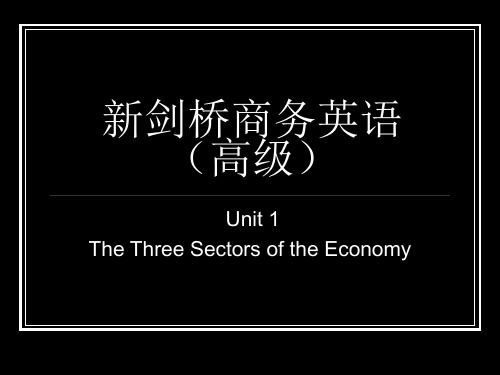
Unit 1 The Three Sectors of the Economy
1b Key words and Expressions Produce electricity (=generate power发电) Mining of coal (煤矿开采) Pumping of oil (用泵抽取石油) Fuel (提供燃料) the generator (发电机) Laying of miles of cable (铺设几英里的电缆) carry the current (电流) to … (输送电力到。。。)
Unit 1 The Three Sectors of the Economy
1b Key words and Expressions Slide v. (滑行) Printed circuits(印制电路) Scatter v. (散布;四散开来) mosaic (镶嵌) Wires of (如同金属丝/电线一般) motorways (=speedways高速公路)
Unit 1 The Three Sectors of the Economy
1b What is the key point that this extract is making about economies? Answer: The text suggests(=gives hints暗示) that most people take for granted(想当然) the amazing complexity(复杂性) of the economic infrastructure(基础设施).
Unit 1 The Three Sectors of the Economy
2 Manufacturing and Services Key words and expressions: Loss(损失) Depend on (=count on依赖;取决于) To the extent (达到。。。的程度) Concern about (=care about关心;关注)
新编剑桥商务英语高级unit1
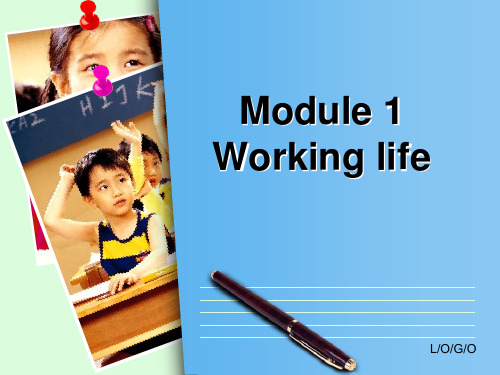
2. Discuss these questions.
How many jobs do you expect to have in your life? 1-3, 47, 8 or more Would you prefer to be self-employed or an employee? Why? In fifteen years’ time, do you expect to be working more or less than now? At what age do you expect to stop working? 55, 65, 75
Useful expressions
• I expect to have at least 5 jobs, because with age and experience, I may develop new interests and aptitudes, therefore, I may change my job accordingly. • I can’t expect to have only one job because nowadays the employment market is subject to change. • I like changes, I like meeting different people and I want higher salary, so I may change jobs often until I find the job which can give me great job satisfaction. • I want to be self-employed, because I don’t want to work for somebody else. I want to be my own boss.
剑桥商务英语中级(词汇)

《新编剑桥商务英语中级》Unit 1a Teamworktoiletries:n. 化妆品厂、清洁、化妆用品公司major brands:主导品牌expatriate:n. 旅居海外的,移居国外的creative thinking:创新思维 a survival course:生存技巧培训课程profile:n. 简介、小传、概况simulation:n. 模拟训练go for profit:追求利润behind schedule:进度落后于计划stick to the schedule:严格按计划进行Unit 1b Communicationexceed:v. 超越、胜过over-estimate:vt. 过高的估计manageable:adj. 便于管理understate:vt. 轻描淡写的说seminar:n. 研讨会、讨论会management:n.〔企业、机关的〕管理人员follow-up evaluation:后续评估deadline:n.最终期限complimentary ticket:免费赠送的票Self-study and Exam practicehave everything to do with:与…关系密切curriculum vitae:个人简历、履历,简称CV human factor:认为因素aggressive:adj. 咄咄逼人的、好斗indicate:vt. 显示、表明Unit 2a Entertainingcustomer satisfaction form:顾客满意、情况问卷表complete the form 填写表格questionnaire:n.调查表、问卷criteria:n. 标准〔为criterion的复数形式〕atmosphere:n.氛围attentiveness:n.殷勤、周到value for money:物有所值程度enhance:vt. 提高、增加mezzanine:n. 〔尤指介于一层与二层之间的〕中层楼reasonable prices:合理的价格interior design:室装修group dining:团体用餐catering requirement:餐饮要求tour groups:旅游团corporate events:公司社交活动wine tastings:品酒会steak:n.牛排company presentations:公司业务报告会business trip:公务旅行vegetarian:素食者call in:顺路到某处alike:adv. 一样的,相似的evolve:逐渐发展或完成pride ourselves on/upon:为…感到骄傲along with:同…一道be of importance:具有重要性to cater for:提供餐饮服务,接待gently:adv. 轻轻地,小心地strive:为获得…而努力奋斗concept:n. 概念,观念,想法distinctive:adj.与众不同的suitable:adj. 舒适,合适memorable:adj. 难忘的tourist:n. 游客,观光客awful:adj. 糟糕的,恶劣的Unit 2b Corporate hospitalitycorporate hospital:商务接待,企业社交tip:n. 技巧,窍门,忠告be in need of:需要mention:v. 提起,说起social setting:社交场合in due course:经过一段时间,到适当的时候poor timing:不合事宜trade fair:贸洽会teenage:adj. 少年的prospect:n. 可能的,潜在的顾客hook:钩子,吸引人们兴趣或注意力的方式a fact-finding mission:情况调查,实地考察substantial:adj.重大的,有影响的fortunately:adv. 幸运的concern:v. 对…有印象;n.担心sociable:adj. 好交际的,喜欢与人交往的ensure:v.确保,保证rugby:n. 〔英式〕橄榄球intimate:adj.亲密的;n.至交,密友ability:n. 能力,技能,本领purposeful:adj.有清晰目的,有明确目标chit-chat:n.〔非正式〕聊天,闲谈disposal:n. 丢弃,处理therefore:adv. 因此,所以see…as:把…看作lie in…:〔原因、兴趣、答案等〕在于…stand around:闲站着add up to:意味着,说明whisper into his ear:在某人耳边低声说话in term of:从…的角度来看,就…而言in due course/time:经过一段时间,到适当的时候Self-study and Exam practicecontinental breakfast:欧式早餐bilingual applicants:具有双语能力的申请者end-of-year party:年终聚会job advertisement:招工广告marketing secretary:营销部秘书P.A. 〔Personal Assistant〕:私人助理administrative support:行政管理上的支持secretarial skills:文秘技能up-to-date information technology:最新的信息技术communications skills:沟通能力,交际技能science marketing assistant:科技营销助理an internal recruitment policy:部招工政策official working hours:正式的工作时间long-term employment:长期雇用production manager:生产经理work overtime:加班take legal action against:对…提出诉讼settle the dispute:解决纠纷secretarial and administrative staff:文秘及行政人员unforeseen circumstances:难以预料的情况meet agreed delivery dates:按约定的日期准时送货place your order with:向…定货outlet:n.代销店,专卖店legal advisers:法律顾问established customers:老顾客bring…up:把…提出来give…priority:优先考虑,处理某事 a backlog of orders:积压的订单at one’s disposal:由…自由支配be popular with ab.:为惯用搭配,深受喜爱on…basis:在…基础上look forward to sth.:期盼,盼望price前一把用介词at value for money:物有所值cater for:承办an overview of…:对…的概述call in:来访call by: 顺道访问推迟到某个时间用postpone till/until…a long way from:离…还差得很远Unit 2 Customersreorganise:n.改组,改编loan:n.银行贷款forecast:n.预测consume:v.消费,消耗venture:n.风险项目warranty:n.〔产品的〕保证书oval:椭圆形finalise:v. 确定,最后定下backlog:n.积压未办的事情substantial:adj.重大的,可观的,坚固的,有影响的Unit 3aOrdering goodsmail order company:邮购计划headquarters:n.〔公司〕总部catalogue:n.商品目录单recommendation:n.推荐信、建议item:n. 产品、货物in standard length:标准长度的article:n. 商品、项目measurements charts:尺寸图knitted skirts:针织裙子vendor:n. 销售商asap〔as soon as possible〕尽快Unit 3bCash flowcash flow:现金流向、现金流量,现金流动cash flow gap:现金流量差额case study:案例分析finalpayment:最后付款bar chart:柱形图down payment:订金bill:vt. 要求支付…的费用remainder:n.剩余物early settlement discount:提前付款折扣labour cost:劳动力成本credit terms:信用期限、信用条件outstanding:adj. 剩余的outstanding balance:剩余金额order books:订货薄 a shortage of cash:现金短缺turnover:n. 营业额financing costs:筹措成本cash on delivery:货到即付款margin:n. 利润inventory:n.库存、存货penalty:n. 处罚、罚款potential customer:潜在客户hard sell:强行推销flat management culture:扁平化的管理结构Self-studyand Exam practiceworkmanship:〔尤指精细的〕工艺,手艺negotiate:v.谈判,商定retail:v.零售detail:n.细节deliver:v. 把…送往delivery:n.送货measurement:n.长度,高度gap:n.缺口,差距forecast:n.预测,预报settlement:正式协议penalty:n.惩罚,处罚charge:n.费用,v.收费potential:adj.潜在的,可能的n.潜在性,可能性grant:n.给予,准予patient:adj.有耐心的,忍耐的patience:耐心,忍耐familiar:adj. 熟悉的average:adj.平均的lack:n. v. 没有,不足,缺乏aggressive:n.好斗的,雄心勃勃的furthermore:adv. 而且,不仅如此however:然而,不过,但是sector:n. 〔尤指商业、贸易等的〕部门,行业accordion:n. 手风琴for instance:例如combination:组合,联合promotional:〔电影、活动等〕旨在推销〔宣传〕的combine:v. 〔使〕组合equally:adv. 相同的,相等的equalize:v. 使相等的equality:n.平等segment:n. 部分alternate:adj. 轮流,交替cable:n. 电缆,缆绳forthcoming:adj. 即将,到来demonstrate:v. 证明,证实flatter:v. 奉承,讨好,感到荣幸cash on delivery:货到付款credit terms:信用期限,信用条件interest on…:…的利息,习惯用onpay for…:支付…的费用,用介词for pay in cash:in表示付款方式,以现金形式price…at:以…的价格,习惯用介词at cost of labour:劳动成本as down payment:作为订金outstanding balance:剩余金额30 days net:净30天early settlement discount:提前付款折扣penalty charge:罚款Unit 3 Commercecurrency:n.货币paying-in slip:[英]〔银行〕存款单payee:n.收款人deduct:v.减去,扣除transaction:n.交易,事务counterfoil:n.存根adviser:n. 顾问interest:n.利息cashier:n.出纳deposit:n.定金,首付dividend:n. 股息,红利deductible:adj. 减去haulage:n. 货运业,货运费consignment:n. 托运的货物margin:n. 页边,空白courier:n. 〔递送包裹或文件的〕信徒logistic:n. 后勤;逻辑custom duty:关税overdraft:n.透支额Unit 4a Brand powerselling point:卖点environmental-friendliness:n. 对环境无害,有环保的特点user-friendliness:n.用户使用方便kitchen appliances:厨房用具competitive advantage:竞争优势diversify:vt. 多样化经营,增加产品种类own-label clothing:贴〔名牌超市〕自己品牌的服装saturate:vt. 使饱和supermarket chains:连锁超市industry analyst:行业分析家cut-price:削价出售retail food marker:食品零售市场mortgage:n.住房按揭,抵押margin:n. 利差,赚头boost profit:提高利润estate agent:房产商bonus points:〔消费积分〕loyalty scheme:忠实〔顾客〕奖励计划voucher:n.优惠,奖券interest rate:利率incentive:n.刺激,鼓励reputation:名誉、名望gradually:adv.逐渐的,逐步的eventually:adv.终于、最终survey:n.调查、审视combine:v.组合,综合outlet:n. 专卖店、分销店fixed rate:固定利率banking on a Brand:bank on既可解释为"依赖…获利",也含有"对…抱有信心"。
新编剑桥商务英语(初级)学生用书答案
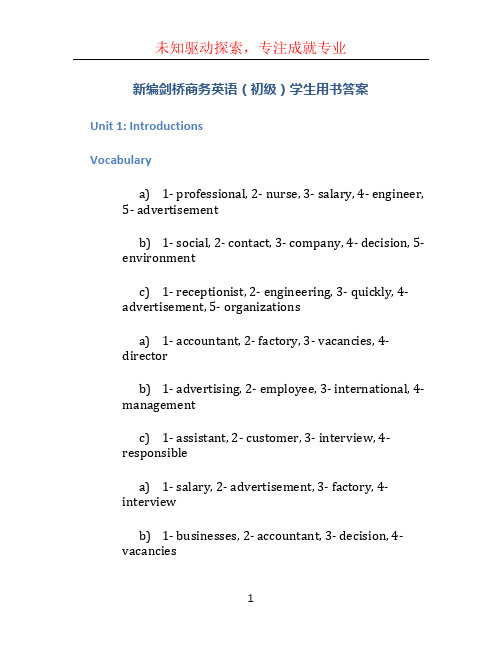
新编剑桥商务英语(初级)学生用书答案Unit 1: IntroductionsVocabularya)1- professional, 2- nurse, 3- salary, 4- engineer,5- advertisementb)1- social, 2- contact, 3- company, 4- decision, 5-environmentc)1- receptionist, 2- engineering, 3- quickly, 4-advertisement, 5- organizationsa)1- accountant, 2- factory, 3- vacancies, 4-directorb)1- advertising, 2- employee, 3- international, 4-managementc)1- assistant, 2- customer, 3- interview, 4-responsiblea)1- salary, 2- advertisement, 3- factory, 4-interviewb)1- businesses, 2- accountant, 3- decision, 4-vacanciesc)1- receptionist, 2- responsible, 3-advertisement, 4- contactSpeakinga)Hello, my name is John. I am a nurse.b)Hi, my name is Maria. I work as an engineer.c)Good morning, my name is Mark. I am anaccountant.a)Nice to meet you too. What do you do for aliving?b)I’m an engineer. I work for an internationalcompany.c)Hi! What’s your occupation?a)I work in a hospital. I take care of patients.b)I work in a manufacturing company. Ispecialize in process engineering.c)My role is to deal with financial matters andmanage accounts.Unit 2: JobsVocabularya)1- colleague, 2- application, 3- letters, 4-experience, 5- interviewb)1- statement, 2- skills, 3- interview, 4-competitive, 5- letterc)1- vacancy, 2- recruiter, 3- experience, 4-application, 5- skillsa)1- competitor, 2- advertisement, 3- salary, 4-departmentb)1- letter, 2- responsibility, 3- experience, 4-interviewc)1- recruiter, 2- vacancy, 3- contact, 4- applicanta)1- advertisement, 2- interview, 3- condition, 4-experienceb)1- position, 2- applicant, 3- competitor, 4-recruiterc)1- department, 2- applicant, 3- opportunity, 4-advertisementSpeakinga)Have you applied for any jobs recently?b)What kind of experience do you have in thisfield?c)How did the interview go?a)I have submitted my application to a fewcompanies.b)I have experience in sales and customer service.c)The interview went well. I am waiting for theirresponse.a)What are some skills required for this position?b)How competitive is the job market in thisindustry?c)Can you give me any advice for writing a coverletter?Unit 3: CompaniesVocabularya)1- profit, 2- competitor, 3- industry, 4-investmentb)1- employee, 2- competitor, 3- successful, 4-investmentc)1- profit, 2- industry, 3- customer, 4-investmenta)1- competitor, 2- industry, 3- product, 4-customerb)1- employee, 2- competitor, 3- successful, 4-investmentc)1- profit, 2- product, 3- investor, 4- industrya)1- customer, 2- investor, 3- industry, 4-successfulb)1- business, 2- profit, 3- competitor, 4- industryc)1- employee, 2- investor, 3- successful, 4-industrySpeakinga)What factors contribute to a company’s success?b)Can you give an example of a successfulcompany?c)What industries are most profitable in thisregion?a)How do companies invest in research anddevelopment?b)Can you name a few competitors in thisindustry?c)What makes a company stand out from itscompetitors?a)How important is customer satisfaction inbusiness?b)Are there any major investors in this industry?c)What are the key factors for a successfulbusiness in this industry?ConclusionThis document contains the answer key for the New Cambridge Business English (Introductory) Student Book. It includes vocabulary exercises and speaking practice for Unit 1, Unit 2, and Unit 3. By studying and practicing these answers, students will be able to improve their understanding and communication skills in the field of Business English.。
BEC商务英语课件:04Unit 1b COMMUNICATION
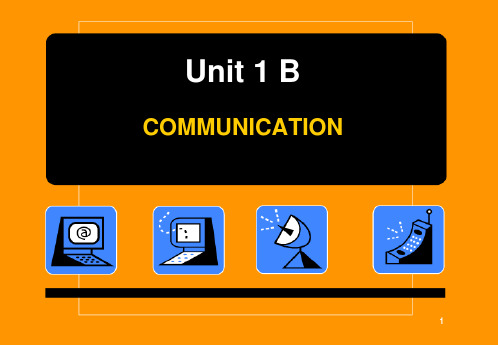
Listening 1
• PREDICT what words or phrases might associate with these functions.
• Keys: • 1. B • 2. C • 3. G • 4. H • 5. E
13
Flashback
• Which messages do you find quite difficult? • What makes them difficult? • Phrasal verbs like “put back, work out” • Redundant information: call 4 • Long sentences and late purpose statement • Understatement: “a little bit on the optimistic
8
KEY WORDS
• Dominance • Official • Bilingual • Overestimate>>>>understate • Over-complicate • Chunk • Approach to • Idiomatic • Culture-specific • Interpret
– 1st: be very clear – 2nd: establish context – 3rd: make requests simple and polite – 4th: give clear contact information
11
Barriers to Effective Communication – Unclear language – Cultural Differences – Red tape – Distraction –…
剑桥商务英语初级试卷Unit1b.doc
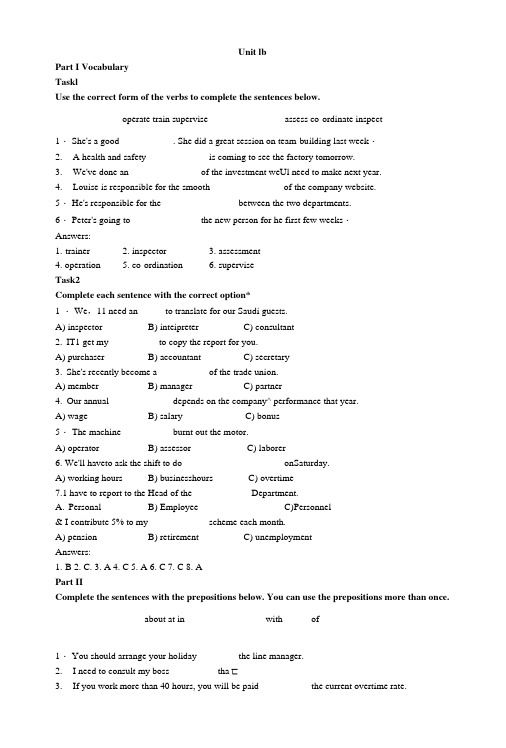
Unit lbPart I VocabularyTasklUse the correct form of the verbs to complete the sentences below.operate train supervise assess co-ordinate inspect1・ She's a good __________ . She did a great session on team-building last week・2. A health and safety ____________ is coming to see the factory tomorrow.3.We've done an ______________ of the investment weUl need to make next year.4.Louise is responsible for the smooth ______________ of the company website.5・ He's responsible for the ________________ b etween the two departments.6・ Peter's going to ______________ the new person for he first few weeks・Answers:1.trainer2. inspector3. assessment4. operation5. co-ordination6. superviseTask2Complete each sentence with the correct option*1 ・ We,11 need an _____ to translate for our Saudi guests.A) inspector B) inteipreter C) consultant2.IT1 get my __________ to copy the report for you.A) purchaser B) accountant C) secretary3.She's recently become a _________ of the trade union.A) member B) manager C) partner4.Our annual _____________ depends on the company^ performance that year.A) wage B) salary C) bonus5・ The machine __________ burnt out the motor.A) operator B) assessor C) laborer6. We'll haveto ask the shift to do ____________________ onSaturday.A) working hours B) businesshours C) overtime7.1 have to report to the Head of the ___________ Department.A.Personal B) Employee C)Personnel& I contribute 5% to my ___________ scheme each month.A) pension B) retirement C) unemploymentAnswers:1.B2. C.3. A4. C5. A6. C7. C8. APart IIComplete the sentences with the prepositions below. You can use the prepositions more than once.about at in with of1・ You should arrange your holiday ________ t he line manager.2.I need to consult my boss _________ tha匸3.If you work more than 40 hours, you will be paid __________ the current overtime rate.4.If you want, you can have time off instead ___________ overtime pay.5.We need to keep a record _________ the hours you work every month.6. A shift system is _________ operation・7・ I don^t work late _________ the office very often.8.We have a lot of problems ________ pay.9.Please write all meetings _________ the diary.10.They arc having a meeting next week _________ t he new sales reps. Keys:I with 2 about 3 at 4 of 5 of 6 in 7 at/in 8 with 9 in 10 about/withPart III ReadingQestionl-5•Look at questions 1-5・•In each question, which sentence is correct?•For each question, mark one letter (A, B or C) on your Answer Sheet.Successful applicants for the job must haveA.received database training,B.worked as a PA before・C.gained a marketing qualification.2.Which sentence describes the situation with the trains?A.The train to London is running an hour late,B.The train to Wolverhampton will arrive on time.C.The train to Exeter is a few minutes behind schedule.3.Which sentence describes the offices?A・ They are open all night.B.They are in a modern building,C.They are in the city centre・4.What does Sue Baker plan to do?A.speak to employees at 2 pmB・ discuss arrangements for a meetingC. inform staff of a salary increase5.What did Janice do?A.She promised to telephone Sam again.B.She apologized for handing in the report late,C.She left a message for Sam to contact her.kcys:l B 2 C 3 A 4 A 5 CQuestions 6T0•Look at the list below .It shows a number of business training courses ・•For questions 6-10, decide which training course (A-H) each person needs. •For each question, mark one letter (A-H) on your Answer Sheet•Do not use any letter more than once・6.Office manager Helen Turner needs to deal with complaints from staff about some colleagues9 use ofemail・7.Before deciding to buy a new computer, David Thompson wants to find out whether he can update hisexisting equipment.8.Claire Colliefs toy company has a major new customer and she needs to manufacture more goodswithout increasing staffing levels.9.Publicity manager Brian Steward did a computer course several years ago, and now wants to learnabout developments relevant to his field.10.Richard Masters was recently promoted and would like to improve his ability to meet deadlines. Answers:6.D7.B8.H9.E 10.GQuestions 11-15• Read the memo and e-mail, then complete the form below. Write each word, phrase or number in CAPITAL LETTERSMEMOTo All Line ManagersFrom James Bensen, AccountsOvertime PaymentPlease could you let me have any staff overtime details dating from 30/10/01 to 29/11/01 as soon as possible so that the salaries can be calculated? Please remember to state if the worker would prefer to be paid or have leave・Thanks very much・To: jamesbensen@From: johnkni^ht@Subject: Overtime paymentJason Martin, Quality ControlAssistant in Production, has done 32 hours' overtime this month, i.e. four extra shifts. He would like to have time off.OVERTIME PAYMENTWorker's name: (11) _______________________Hours worked: (12) ________________________Period ending: (13) _Pay/Lcavc: (14)_Department: (15)Keys:(11) JASON MARTIN (12) 32 (13) 29/11/01 (14) LEAVE (15) PRODUCTIONPart IVLook at the answers given to a candidate at a job interview. Say whether the following sentences are ^Righf or Wrong5 or 'Doesn't say,.1 ・ The oldest worker in the company is 62-years old.A. RightB. WrongC. Doesn't say2.Employees can have more than 25 days' holiday a year.A. RightB. WrongC. Doesn't say3.All employees are part of the company's profit-sharing scheme.A・ Right B. Wrong C. Doesn't say4.The trade union has a good relationship with the management.A. RightB. WrongC. DoesnY say5. Employees receive a good monthly income when they retire.A. RightB. Wrong C・ Doesn't say6. Employees need a doctor's certificate if they have a day off work sick.A. RightB. WrongC. Doesn't say7・ The company believes in giving large pay rises.A. RightB. WrongC. Doesn't say& All employees finish work at the same time.A. RightB. WrongC. Doesn't sayAnswers:1. B2. A3. B4. C5. C6. B7. C8. BPart V ClozeQuestion 1-12•Read the newspaper report below about working in sales・•Choose the correct word to fill each gap, from A, B or C.•For each question, mark one letter (A, B or C) on your Answer Sheet.WORIKING IN SALESWorking in sales is one of the few areas where first impressions really matte匚Good sales people (1) _________________ to have the personality to get on with customers. Three years ago, Julian Agostino identified a (2) ____________ for matching (3) ______________ right people to sales jobs, and began Sales Moves, a recruitment fai匚To achieve (4) __________ he got the idea after he was (5) ___________ in setting up a telesales company and found (6) _______________ was difficult to recruit good people・He says: “(7) __________ the sales sector is enormous, there appeared to be (8) ___________ specialist recruitment help・ I decided to hold fairs across the country, which allowed employers and employees to meet.” His company is doing very well. (9) _________________ recently, most companies asked for graduates and offered the chance to go on to work in (10) __________ parts of the company later on. Today, many are more interested (11) ________________ recruiting good sales people ・high achievers (12) __________ career will continue in sales.l.A. need B. must C. should2. A • request B. claim C・ demand3. A. a B. some C. the4.A ・ there B. this C. those5. A. involved B・ concerned C. required6. A. that B. it C. he7. A. Although B. Despite C. If8. A. any B. few C・no9. A. Now B. After C. Until1()A other B・ another C・ others11A on B. in C. at12.A. who B. which C. whoseAnswers:l.A 2.C 3.C 4. B 5.A 6. B 7. A &C 9.C 10. A 11.B 12.C Questions 13-23•Read the article below about attending job interviews.•Choose the correct word to fill each gap, from A, B or C・•For each question, mark one letter (A, B or C) on your Answer Sheet.How to succeed at interviewsPreparation for interviews is essential. Interviewers like to see people that (13) __________ prepared to ask questions about the company. (14) _____________ good interviewer is going to be looking for candidates (15) _________________________________ demonstrate that they will (16) ___something new to the company. Think of the things you (17) _________________ contribute to the organization.Looking good is also very important. (18) ______________ m any companies now allow (19)_________ formal clothes in the workplace, this does not mean it is no (20) ___________________ essential to wear a suit for an interview. The most important thing is to be yourself. (21) _________ you must never do is (22) _________ to be something you are not, in order to get the job. If you have to do (23) _________________________ , then you will probably not enjoy working in the position,(24) _________ will the job be suitable for you.13. A .be B. are C.is14. A- Any B. That C・ Some15. A. which B. whose C. who16. A. fetch B. carry C. bring17. A. need B. ought C. could18. A. Despite B. Although C. But19. A. least B. little C・ less20. A. longer B・ further C・ more21. A .What B. How C. Why22. A. try B. tried C. tries23. A. these B・ this C. one24. A. nor B. not C • neverAnswers:13. B 14. A 15. C 16. C 17. C l&B19. C 20. A 21. A 22. A 23. B 24. APart VI WritingTasklYou are going to spend holidays in Hawaii in June・ Suddenly you received a letter from an important customer, Mr. Elton Deland, who will arrive on 25th June and discuss the claim・ You have to delay thetrip till July.•Write a short message to Ms. Anne Folstei; your secretary・•Explain why you postpone your (rip.•Mention the date when Mr. Elton Deland will arrive.*Ask her to arrange your meeting.*Write 30-40 words on your Answer Sheet.(Sample for reference)To : Ms. Anne FolsterI have to delay my trip to Hawaii till July,as Mr. Flton Deland will arrive in London on 25th June and discuss the claim face to face・ Please arrange our meeting on 26th June・Task 2It is the beginning of December and you have been asked to find out how many days' holiday staff in your department intend to take over Christmas.•Write a memo to all staff in the department:*saying on which days the company is closed*asking them to confirm their holidays*giving a deadline for filling in holiday forms.•Write 30 -40 words.。
剑桥国际英语教程Interchange1 -Unit 1 partB
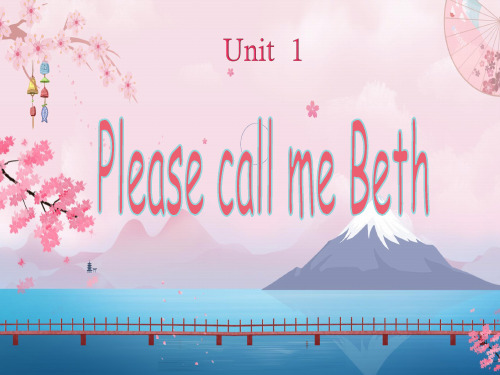
• Ben: tall, strong, quiet, lovely, gentle • David: strong, handsome, clever, humorous,
dependent • James: strong, handsome, frank • Jason: good-looking, funny, athletic • Steven: tall & strong, calm, polite, kind • Vincent: quiet, artistic • William: conservative, smart, serious
• What English names do you like? Why? • Why are they popular?
• What names are popular in your country? • Why are they popular?
1. Are David’s classmates interesting this semester? Yes.
2. Are David and Beth in the same chemistry class? No.
3. Is Sun Hee on her way to class? No.
Last name Miller Vera Kim
Where from? the United States
Mexico South Korea
New Words for Reading
• identity [ai‘dentiti] n. the fact of being who or what a person or thing is.
a pat on the back
新编剑桥商务英语unit1

(1) __O_p__e_n__y_o_u__r_m__i_n_d___
Bosses should consider requests for flexible working from employees with children under six. So embrace the benefits: ‘ Twice as much experience, skills, brainpower and energy,' Savage says.
Business English
Module 1 Business topic
1.1 Ways of working 1.2 Making contacts
1.1 Ways of working
Vocabulary
Different ways of working
Reading
How to job-share
Plan the system for handing work over carefully and play to each other's different strengths . Delegate the workload according to each other's particular skills and qualities.
Get organized Set your limits
Put pen to paper
Two become one
Open your mind Plan for disaster
Find the perfect partner Don't feel guilty
Wouldn't it be nice if the working week finished on Wednesday? With a job-share it can. Here's the essential guide to making it work .
剑桥标准英语标准1b参考答案

剑桥标准英语标准1b参考答案Unit 1: My Classmates1. Vocabulary Exercise:- Classmate: A person who is in the same class as you.- Teacher: A person who teaches you.- Desk: A piece of furniture for writing or studying.- Chair: A piece of furniture for sitting.2. Listening Exercise:- Who is the teacher's favorite student? The teacher's favorite student is Tom.- What is the name of the girl with long hair? The girl with long hair is called Lucy.3. Reading Comprehension:- How many classmates are mentioned in the text? There are four classmates mentioned in the text.- What does Jack like to do? Jack likes to play football.4. Grammar Focus:- The correct form of the verb "to be" for the third person singular is "is".- Example sentence: She is a student.Unit 2: My Family1. Vocabulary Exercise:- Father: A male parent.- Mother: A female parent.- Brother: A male sibling.- Sister: A female sibling.2. Listening Exercise:- Who is the oldest in the family? The oldest in thefamily is the father.- What is the sister's name? The sister's name is Emily.3. Reading Comprehension:- How many family members are there? There are five family members.- What does the mother do for work? The mother is a doctor.4. Grammar Focus:- The plural form of "box" is "boxes".- Example sentence: There are many boxes in the room.Unit 3: My Hobbies1. Vocabulary Exercise:- Hobby: An activity done regularly in one's leisure time for pleasure.- Painting: The activity of applying paint to a surface.- Reading: Looking at and understanding written or printed matter by sight.- Playing: Engaging in an activity for enjoyment and recreation.2. Listening Exercise:- What is the boy's hobby? The boy's hobby is playing the guitar.- What does the girl like to do after school? The girl likes to read books after school.3. Reading Comprehension:- What are the three hobbies mentioned in the text? The three hobbies mentioned are painting, reading, and playing sports.- Which hobby does the author prefer? The author prefers playing sports.4. Grammar Focus:- The present simple tense is used to describe habits or regular activities.- Example sentence: I read books every evening.Unit 4: My House1. Vocabulary Exercise:- House: A building for human habitation.- Kitchen: A room used for cooking.- Bedroom: A room used for sleeping.- Bathroom: A room containing a toilet.2. Listening Exercise:- Where does the family usually have dinner? The family usually has dinner in the kitchen.- How many bedrooms are there in the house? There are three bedrooms in the house.3. Reading Comprehension:- What color is the living room? The living room is blue. - How many floors does the house have? The house has two floors.4. Grammar Focus:- The possessive form of "house" is "house's".- Example sentence: This is the house's backyard.Unit 5: My Day1. Vocabulary Exercise:- Morning: The early part of the day.- Afternoon: The middle part of the day after noon.- Evening: The part of the day between the end of afternoon and the beginning of night.- Night: The time when it is dark between the sunset and sunrise.2. Listening Exercise:- What time does the student usually wake up? The student usually wakes up at 7 am.- What does the student do in the evening? The student watches TV in the evening.3. Reading Comprehension:- What is the student's favorite time of the day? The student's favorite time of the day is the evening.- What does the student do after school? The student plays football after school.4. Grammar Focus:- The present continuous tense is used to describe actions happening at the moment of speaking.- Example sentence: I am reading a book right now.Unit 6: My School1. Vocabulary Exercise:- School: An institution dedicated to education, where teaching and learning take place.- Library: A building or room containing collections of books, periodicals, and sometimes films and recorded musicfor people to read,。
新编剑桥商务英语unit_1

Key Points
➢Topic analysis:job-share
1 guide to… 2 make it work 3 share credit and blame 4 Flexecutive 5 consultancy 6 “We had been over-optimistic. I did manage to find someone else who fitted in with me, but I was very lucky.” 7 play to 8 manage 9 parental leave
Hard to progress your career
No job security
flexitime
Good for work-life balance
Hot-desking Saves the company
money
Not good for people who like routine
Disruptive to employees
弹性工作(上班)时间 办公桌轮用 办公室小道消息 赞扬,功劳 总裁,总经理 智能 作最坏打算的,为最坏
情况的 事态,局面 全日制的 授权,分派工作
Useful Words and Expressions
availability job-sharer parental-leave distractions contact case-load daily-log voice mail self-organization disruptive
)
办公桌轮用制 Hot desking
Hot desking这个说法据说是来源于海军的一个惯常做 法,叫hot racking,也就是不同班次的水手共用几个 休息铺位。 上班需要一直待在办公室的人们大概都有 专属于自己的办公桌,而那些大部分工作都不需要在办 公室完成的人们,就算有个办公桌也没什么时间享用。 所以,现在很多地方都流行hot desking,同一个办公 桌可能从周一到周五的主人都不同。
- 1、下载文档前请自行甄别文档内容的完整性,平台不提供额外的编辑、内容补充、找答案等附加服务。
- 2、"仅部分预览"的文档,不可在线预览部分如存在完整性等问题,可反馈申请退款(可完整预览的文档不适用该条件!)。
- 3、如文档侵犯您的权益,请联系客服反馈,我们会尽快为您处理(人工客服工作时间:9:00-18:30)。
Vocabulary2-2
department training budget 部门培训预算
deadline 最终期限
voice mail 语音信息
answering machine 录音电话 (英国英语用 answer phone)
Step 2 Answer the questions about the article and check the answers.
Step 3 Explain the title and some new words and useful expressions.
商学院工商管理系 商务英语 Unit 1 b Communication
商学院工商管理系 商务英语 Unit 1 b Communication
Teaching Objective
To enable Ss to take and leave telephone messages
To raise awareness of clarity in spoken language
Taking messages: listening, language
focus, speaking
商学院工商管理系 商务英语 Unit 1 b Communication
Keeping in touch
Vocabulary Reading questions Text Oral practice Interview(audio)
商学院工商管理系 商务英语 Unit 1 b Communication
商学院工商管理系 商务英语 Unit 1 b Communication
Reading
Step 1 Read the article about using English for international business, looking for the topic sentence and the key words and give a title to each paragraph.
商学院工商管理系 商务英语 Unit 1 b Communication
商学院工商管理系 商务英语 Unit 1 b Communication
Teaching Objective Unit overview Content 1 2 3 学时分配 3*45 min 学生作业 supplements
Reading questions
Why does Ericsson use English as its official language?
What can native English speakers do to communicate more effectively?
Why are native English speakers unaware of the difficulties of listening to foreign languages?
To practice reading for gist and specific information
To practice listening for gist and specific information
商学院工商管理系 商务英语 Unit 1 b Communication
Unit Overview
half-year sales report 半年度销售报告
complimentary ticket 免费赠送的票
native speaker 操本族语言的人
time schedule/ 时间安排表
Ericsson 全名为 Ericsson Telecommunica工商管理系 商务英语 Unit 1 b Communication
Vocabulary1-2
international communication 国际交流 official language 官方语言 language skills 语言技能 exceed 超越 over-estimate 过高地估计 manageable 便于管理 understate 轻描淡写 culture-specific 某一文化所特有的 work environment 工作环境 the business world 商界 seminar 研讨会(研究生班) management 管理人员 follow-up evaluation 后续评估 supplier 供应商
Keeping in touch: Speaking to find out
each other’s use of various forms of communication, reading
Leaving voice mails: Listening,
language focus, speaking
Stockholm 斯德哥尔摩(瑞典首都)
Helsinki 赫尔辛基 (芬兰首都)
Scandinavian 斯堪的纳维亚(北欧地区,包括挪威,瑞典,丹麦,冰岛等国 家)
Copenhagen 哥本哈根(丹麦首都)
Danish Telecommunications Trade Fair 丹麦电子通信交易会
Unit 1 b Communication
Communication
Discussion: Divide the class into groups and discuss the following questions:
➢ How many forms of communication are there in our modern society? Rank them in terms of formality. ➢ What form of communication do you usually use? Why and why not?
